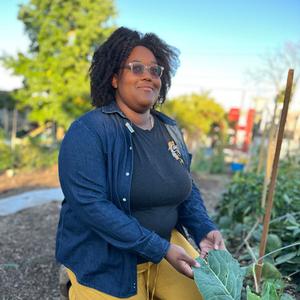
Lessons for Students from the Garden: Part 1
The following 'Lessons from the Garden' can be used as tools for reflection before taking steps into new transition phases.
By Justina Thompson — January 4, 2023

There are many lessons to be learned from nature and its many ecosystems. Thinking about the root systems thriving in the soil and beyond, reflections can help guide us through life, especially college. As a new journey based on knowledge and transition, college can offer a lot but also take a lot out of us. Having grounding 'pocket parables' to refer to in times of change can provide something firm to stand on in times of need. The following 'Lessons from the Garden' can be used as tools for reflection before taking steps into new transition phases. Those moments of pause allow for intention to fuel the next step forward.
"The day you plant the seed is not the day you eat the fruit."
Some crops can take up to 10 months to grow fully to maturity. At our farm, we just had an abundant December harvest of ginger from our greenhouse, which was planted back in March! The browning on the leaves signals harvest, and we had to wait patiently for the leaves to turn color. But during this time, we couldn't just wait and watch. We had to ensure it was regularly watered, nurtured with the right nutrients, and kept at a consistent temperature.
This lesson can be translated to the college experience when considering the growth that may happen over the course of a semester. We start the semester with goals, schedules, and plans and won't know the end outcome until months later when the semester ends. But in between, if we don't study, read, and engage with the class content in other ways, we won't see the rules we planned for at the beginning of the term. Sometimes, this even means playing a long game.
"Allow yourself to flow through the seasons."
Transition through seasons at an urban farm are key points of focus. In nature, there is talk about the magic that happens at the edges and boundaries; this is one perfect example. Seasons are not set by rigid boundaries, although we can intentionally honor equinoxes and new moon phases through land-based rituals.
An intuitive sense is used to know when it's time to close out a bed for the season. It may be three weeks into Fall, but if the leaves are still healthy on the pepper plants and new fruits are being produced, the summer crop can continue into the Fall, even if only for a little while. This flow through the seasons reminds us that transition doesn't have to be so prescribed and that the space of new becomings can bring gifts of its own. What might it look like to take finals season as a time of transition? Instead of inducing stress around how many chapters we can reread and how many times we can run through flashcards, use this time to reevaluate our relationship with knowledge exchange and rest! That lens puts less emphasis on the number or letter grade you receive at the end of the course but on what the journey was able to teach along the way. If you are searching for guidelines on what different seasons can offer you, check out what the agricultural lens offers below:
- The Winter season is about rest and cover-although you can grow in the Winter season, farmers often use this to give the land (and their bodies) rest for the year in preparation for a fruitful and rejuvenated upcoming season. As Winter comes closer to Spring, this season is also used for reflection and planning, utilizing the lessons and medicines from the past season to apply to the future.
- With reflections and lessons from the Winter and previous season at large, the Spring is a time to start fresh with new beginnings. It can be thought of as an incubator period, since seedlings will be started in greenhouses and nurseries at this time. Only after their root systems have been established in the seedlings trays will they be transplanted into their growing space for the season.
- The Summer is all about maintenance and harvesting. This is when pests will be most rampant and crops will need most attention, but also when fruits will be ready for harvest and delicious transformation by way of food and preservation.
"What we see of plants above ground is only the surface."
One of the most fun crops to harvest are potatoes! There is something very healing to the inner child in digging into the soil while assessing the potato harvest. This plant, along with other root vegetables, will grow greens above the ground, but these leaves will not produce the fruit of the harvest-these grow underground! Produce like beets and sweet potatoes will produce edible greens for salads and other tasty dishes, but you usually have to do a little digging work to find what you grew for. It is a mix of intuition, observation, and trial and error to assess when these plants are ready for harvest. The taller and more luscious the greens grow, the healthier we can assume the harvest below grounds is, but is not guaranteed. The same is true with people! We've all seen the iceberg analogy or heard not to judge a book by its cover, but we can never have too many reminders. A course that intrigued you by its title may have an overwhelming syllabus, your roommate may have stretched as few truths on that survey, and your capacity to take on three clubs in one semester may be different than you initially thought it was! What's most important to take away from these analogies are the following questions:
- What are the key signs in and around me that there's care I need to receive
- How can I move with considerations of the invisible weights folks around me may be carrying?
Nature was humankind's first teacher and guide and continues to offer us some of the best grounding as we move through various paths of life. These are just a few anecdotes from nature to give guidance through the transformative journey that is higher education-with more to come! Can you think of any that you've heard from lovers ones?
Check out this recipe for Sweet Potato Greens: https://thewoksoflife.com/yam-leaves/
Check out the video 'Life Lessons Taught By The Garden' by Veladya Organica on Youtube for more grounding perspectives on these lessons!

Justina Thompson
Justina "Farmer J" Thompson is the Farm Education and Volunteer Manager at Urban Creators, Philadelphia, PA. Justina intentionally attended school in Philadelphia so she could “connect her passion and experience to the ongoing environmental justice work in the area.” As a speaker, educational curriculum designer, program leader, and community organizer, Justina possesses extensive knowledge on urban farming inspired to work in the field of environmental justice from a young age.
Maximizing Mentorship
April 30, 2024
The Rise of College eSports
April 29, 2024
